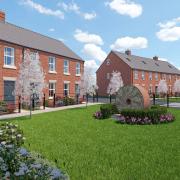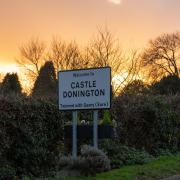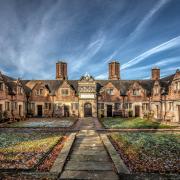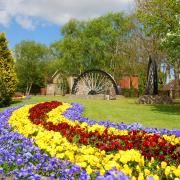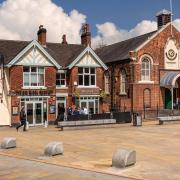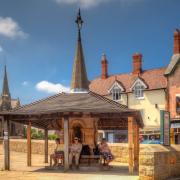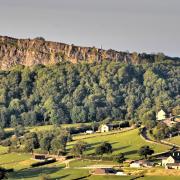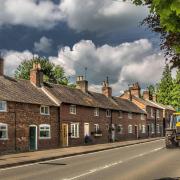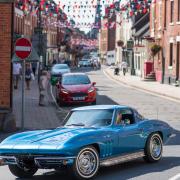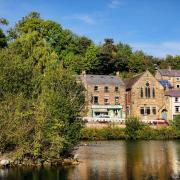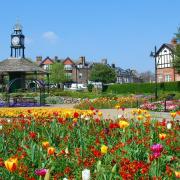Derbyshire Life explores the places and meets the people that make Kirk Langley special

Kirk Langley must be one of the most visible villages in Derbyshire without being well known. It occupies motorists’ minds for but a fleeting moment as they drive from Derby towards Ashbourne and the Peak, so it’s a pleasure to reveal that there is much more to Kirk Langley than the A52.
Most of the village resides in two minor lanes off the main road, bearing the suitably bucolic names of Moor Lane and Church Lane. Just beyond lie Langley Common and Langley Green, while Flagshaw Lane takes you to the Meynell Langley estate where the Meynell family home commands one of the most scenic views in the county. Even the word Meynell has a rustic origin: it is derived from Mesnils in France, with mesnil related to the Latin monsionile, meaning ‘village’.
To hear from one resident that Kirk Langley is a ‘proper village’ is heartening when one considers Derby is only four miles away and, more pertinently, that neighbouring places which were once villages are now conurbations. Indeed, parish councillor Graham Penny and his wife moved here from Littleover 14 years ago because of its ‘rural, unspoilt nature’. He believes Kirk Langley is ‘much as it was many decades ago’, namely a village of ‘great charm’ that includes a conservation area around the handsome parish church and lychgate, an attractive mix of cottages and Georgian houses, primary school, pub, playing field, ancient pound and well, cricket ground, community orchard and a Grade II listed village hall that plays host to a thriving WI and other activity groups. When Graham speaks of the ‘spread’ nature of the settlement, he notes: ‘Outside of the centre of the village there are several other clusters of houses, like satellites, linked by open fields, all of which are covered with public footpaths. There are no real housing estates here… well, not yet.’
There is, however, an industrial estate, albeit a small one and effectively outside of the village, which houses arguably the finest lawnmower manufacturer in the world, while in the heart of the village sits an acclaimed wine merchants, one of the most well-loved nurseries in Derbyshire, and a highly regarded producer of wrought-iron gates, railings and powder coatings.

When Kirk Langley was last written about in Derbyshire Life, Roy Christian referred to it as an agricultural village. Now, there are only two farms left. Retired farmer Richard Morley was born in 1938 when his father ran one of 22 dairy farms in the area. Richard took over the farm when his father died 20 years later, though he was involved with it virtually as soon as he could walk – he drove his first tractor aged nine. ‘Today, Kirk Langley is about 75 per cent dormitory village,’ states Richard. ‘In my day, every household had someone who was involved in farm work.’
It says much about the residents’ attachment to the village that when Richard and his wife were looking to move following his retirement, they found the perfect home: just around the corner on Moor Lane with open countryside to the front and rear. ‘We have wonderful neighbours, too,’ says Richard. I later met him manning a plant stall at a fête in the grounds of St Michael’s Church where he was a warden for 40 years. There was a good turnout at the fête, indicating a thriving church community.
The church sits attractively on raised ground, an imposing presence since the 14th century, though there are traces on a wall near the west door which point to a church on this site dating back to Saxon times. I concur with a 1927 booklet on the village which declared that ‘few, if any, parishes in the Diocese can boast of a more perfect example of a village church.’
Inside, the oldest feature – an early 14th century chancel screen – is reputedly the oldest surviving timber screen in Derbyshire. Another old feature is a rarity in English churches: a squint on both sides of the chancel. Also known as a ‘leper window’, it enabled lepers to see the service without coming into contact with the rest of the congregation.

Unsurprisingly, there are many monuments to the Meynells, ‘few of whose males died in their beds’, as a distinguished visitor once remarked of this notable military family. There is an elaborate memorial to William Meynell who was killed in the Danube in the 19th century when leading the Turks against the Russians; and Major Godfrey Meynell received a posthumous V.C. for bravery on the North-West frontier in 1935.
A more recent memorial is to Rosemary Meynell, the writer and broadcaster who contributed a monthly feature to Derbyshire Life for many years. One of her articles concerned Henry Fielden, rector of St Michael’s from 1821 – when he was only 24 – until he died 64 years later. Fielden was, by all accounts, a handsome flirt who ‘was so charming to every girl he met that many fell in love with him.’ He didn’t marry until he was 42, though his wife was only 19 and his betrothal was both brief and controversial. Squire Meynell’s daughter Marion went to consult him, in his capacity as a clergyman, about a proposal from a wealthy suitor. During their walk back from the church, he persuaded her to throw over her suitor and marry him instead. Tongues wagged in the village that he was marrying Marion as an act of revenge on the Meynells with whom he was embroiled in a feud over which they went to court – Fielden lost.
It’s on the subject of marriage that the Meynells may hold a unique record in the history of manorial ownership. The family came to Langley over 800 years ago and in that time lost the estate three times through marriage and later bought it back again.
Meynell Langley Hall sits in quiet, isolated splendour on a 400-ft contour line. Although it’s the private home of Godfrey and Helen Meynell and their daughters, one way of gaining access to one of the most breathtaking parkland panoramas in Derbyshire is to persuade one’s daughter – as I did – to get married there. I have also photographed a couple of weddings at Meynell Langley Hall, where guests stand in silent, stunned awe of the surrounding countryside. The wedding ceremony is a joy, too, as the light pours in on a delightful, finely-furnished drawing room which was locked in time a couple of centuries ago. On the other side of the entrance hall is a sumptuous library, lined wall-to-wall with age-old volumes complemented by a Blue John-inset Carrara marble fire surround. There are opportunities for other memorable wedding images outside, too, with the view and an adjacent group of colourful acers.
You can find much more than acers just around the corner at Meynell Langley Nurseries, run by Robert Walker whose grandad Samuel was head gardener for the Meynells at the turn of the 1930s. Starting out as a nursery in the 1970s with wholesale cut flowers, it has become a destination nursery. ‘People love to visit us because we’re like a little oasis out here,’ says Robert, ‘and it’s precisely because we’re in the middle of nowhere that personal service is paramount – we need to keep the customers we get!’
The nursery is a kaleidoscope of colourful plants, with another acre of spruce and fir where you can choose your own Christmas tree. After taking a photo in the trials garden, Robert and I occupied the last of the 100 seats in the bright, airy tea rooms, opened five years ago. ‘We said we would be happy if it broke even,’ says Robert, ‘as it would bring so many more people to the nursery. As it is, it’s been a standalone success.’
After tea, I went back to Meynell Langley Hall to meet Godfrey Meynell Snr, now in his early 80s. He resides in one of the apartments in the Italianate stable court behind the house, with his wife, Rev. Honor Meynell, one of the first women in the country to be ordained. Sitting listening to Godfrey – ‘I enjoy sounding off, I’m a professional show off,’ he grinned – it’s clear a book about this extraordinary man is required, rather than a few paragraphs, so I am pleased to hear that Maxwell Craven has been commissioned to write a history of the Meynells. We may have to wait a while, though: although Maxwell has reached Chapter V, it begins in 1397.
Maxwell will doubtless fill at least a chapter on Godfrey’s own colourful, eventful life. When asked about his upbringing on the estate, he mentioned a ‘fierce nanny who beat me a lot’ and spoke fondly of playing in the woods, swimming in the lake and tobogganing down the sweeping hillside. It will be fascinating to read about how an old Etonian, Magdalene College student and leading civil servant in Aden ended up travelling 3,500 miles across Europe to Baghdad to offer himself as a ‘human shield’ in the Iraq war.
The management of the Meynell estate has long passed into his son Godfrey’s hands. ‘My son is perfect in the job,’ states Godfrey Snr. ‘He’s been able to live very much in touch with the place and I’m delighted that in farming the estate he has focused on conservation.’
Godfrey is also involved in frequent litter picks in Kirk Langley and enjoys a close association with the church. He has collected for Christian Aid for 20 years, raising £1,900 last year, and has persuaded Rowan Williams, the former Archbishop of Canterbury, to preach at St Michael’s on 4th November.
Jane Orton, who represents Kirk Langley on the Amber Valley Borough Council, tells of Godfrey’s kindness when as a newcomer to the village she attended the Harvest Supper: ‘As soon as Godfrey noticed me, he purchased a bunch of dahlias from the produce sale and handed me the bouquet, saying “welcome to our village.” I’ll never forget that moment.’
Godfrey also continues the 100-year-old custom of hosting an annual tea party on the estate for the Kirk Langley Primary School pupils. The school’s teachers spoke of the children’s glee in participating in the treasure hunt, races, volleyball, tug-of-war, croquet, skittles and welly-wanging, and their delight in a parting gift, usually of old pennies and other coins. Godfrey was also a weekly visitor to the school where the pupils would read to him, followed by the handing out of prizes.
The school is a handsome Victorian building dating back to the mid-18th century and new headteacher Jayne Stevenson speaks of the ‘beautiful ethos’ of a school where ‘every child can shine.’ As well as the ‘great warmth’ of her teaching staff and ‘a dedication proven by the fact that most have been here for a long time’, she has found a ‘well-behaved, eclectic mix of children’ and loves the rural aspect of the school which brings a ‘strong sense of community’ and one that ‘feels closer to the church.’
The school bell Jayne is holding aloft in the photograph was only recently returned after a gap of 70 years. As Jayne recounts: ‘A boy stole the bell when he left this school in 1945, aged 11, and went to live in Brighton. On discovering it, his mother told the family it was not to be returned as she couldn’t face the shame. It was left in a box in the attic but when the mother died, it was decided it ought to be returned, and here it is. It still rings true.’
Opposite the school is The Cunnery – an ancient field name which means ‘rabbit warren’ – where Gordon Blackwell and his family live. Gordon, who came to live here 30 years ago – ‘we were drawn to the friendliness and good feel of the village,’ he recalls – is the author of Kirk Langley Snippets, a series of seven historical booklets about Kirk Langley, which have helped to raise funds for the church roof repair, Leeke Memorial Hall and the primary school.
Perhaps the village’s most illustrious pupil, who attended a preparatory school in Langley Barton, was Irish Nationalist leader Charles Stewart Parnell. He stayed for just one year – 1854. Another famous resident was a teacher who arrived in 1876 – G B Barrington who went on to play cricket for Derbyshire and devoted over 50 years to Kirk Langley Cricket Club. Following his death, his daughter bought the village cricket ground and gave it to the parish. The G B Barrington Playing Fields are home to the local cricket and football clubs and will host Village Field Day on 30th September with the usual sports challenge between the Uppers and the Downers. As Graham Penny explains: ‘The Uppers live at the top end of the village, and the Downers don’t!’
Up at the top end in Langley Common is community stalwart Margaret Watson, a sprightly 90-year-old who has run the 20-plus allotments there for 65 years. ‘We are known as the Common End up here,’ she points out, ‘though I wonder whether some residents interpret that in a different way!’
A former Land Girl, Margaret came to Kirk Langley in 1952 when ‘everyone knew everybody else and had time for you – it was such a sociable village.’ In 1957 Margaret formed the Kirk Langley Social Committee, ‘to help the lonely, isolated elderly of the village.’ In its 50 years, she has helped to organise dances, parties, fêtes, jumble sales and a horticultural show. In the early 60s, a horse show at Meynell Langley Park even attracted showjumping legends such as Sir Harry Morton Llewellyn, Harvey Smith and David Broome. As Margaret proudly points out: ‘The Showjumping Association said we were the best organised small horse show in the country.’
Langley Common is also home to the Bluebell, recently acquired by Berkeley Inns and facing a bright new future. Amelia Horne of Berkeley Inns explained: ‘Historically the Bluebell has been a busy pub but it had grown somewhat tired over the last few years. We think it’s a great pub so jumped at the chance to acquire it.’ The company is due to extend, alter and refurbish the pub during 2018, which is exciting news given Berkeley Inns’ revitalisation of the Horseshoes on Long Lane and the Cock Inn at Mugginton. They are also soon to re-open the Black Cow at nearby Dalbury Lees.
You are well served in Kirk Langley if you’re a wine drinker. As well as the Wine Appreciation Society that meets in the village hall, there is Meynell House. A handsome Georgian building that once housed the Meynell Arms, it is now home to Worth Brothers, a fine wine merchants run by Tim and Michelle Worth (Tim’s brother Richard runs the Lichfield shop). They stock over 500 wines from small, award-winning, family-run vineyards renowned for their quality. A large, close-knit customer base has grown up through monthly wine tastings – with occasional talks from continental winemakers – corporate/private events, cookery courses and, more recently, Big Green Eggs BBQ courses in their garden.
The Kirk Langley location is a bonus, says Tim: ‘We are highly visible to passing traffic and visitors have often dropped in who’ve driven by and been intrigued to discover what’s inside. They’re all delighted they made the effort, too!’
Being in an attractive, easily accessible rural location that is conveniently close to urban links is the reason the industrial park grew up just outside Kirk Langley. Located there is Impala Stone, run by Tom and Gill Edwards, which produces quality kitchen worktops of supreme craftsmanship made by ‘extremely skilled’ stone masons from granite, quartz, silestone and marble. They also provide stone for bathrooms, staircases and even shop fronts. ‘This is an affluent, attractive rural enclave perfect for our luxury product,’ affirms Gill. ‘The free parking alone makes a massive difference.’
Also on the site is Dennis/Sisis, a lawnmower and ground maintenance equipment company run by Ian Howard, which is hailed as the ‘Rolls-Royce of mowers.’ Their machines maintain the world’s best golf courses, football and cricket pitches. In 2010 the company received its biggest order at the time to supply machines for the World Cup in South Africa, followed by orders for the 2014 World Cup in Brazil and the European Football Championships in 2012 and 2016. They also supply clubs in the MLS (Major League Soccer) in America. Closer to home they supply machines to Twickenham, the Millennium Stadium and Derby County as well as to local bowls clubs and sports clubs at all levels.
‘This is British manufacturing at its best with high calibre employees and high quality built machines,’ states Ian, ‘and they need to be because on a football pitch you might have £500 million worth of players. This means the surface has to be perfect.’
Next door to Dennis/Sisis is All British Precision which produces the 2,000 different components required for its machines.
Precision work of an artistic kind is found nearby at Wheathills Farm on Brun Lane. This is the base of Nigel Heldreich and his team who make personalised furniture and have earned international renown for their unique, exquisite, bespoke memory boxes. Although Nigel prefers to describe them poetically as ‘a touchstone for one’s life’. As he points out: ‘Each piece takes up to eight separate highly skilled disciplines to complete to the client’s satisfaction. Blend that level of skill with intimate, unique, precious and often secret memories, and you have the ingredients to create a piece which has a very high emotional impact.’
Nigel came to view Wheathills in 2001 and although it was, in his words, a ‘grey, crumbly, virtually derelict old building’, he bought it without even looking inside. ‘Some properties are sad and just need a bit of love,’ says Nigel. ‘My family thought I was bonkers but for me it was a new adventure and the property is now alive with creative people and beautiful objects.’
There is a thriving 14-year-old business in the heart of Kirk Langley. Langley Gates and Langley Coatings occupy Tudor House Farm, which still operates as a farm, albeit on a small scale. Owner Philip Spencer’s family farmed here for three generations. He was an agricultural engineer but after making a wrought-iron gate for a local builder saw an opportunity for a more lucrative career. ‘The investment was huge, the gamble was great but the orders flooded in,’ says Philip.
When the powder coating company Philip used to coat his gates closed down, he set up Langley Coatings with his wife Sarah, who he met in 2008 when he called to give her a quote for some new railings. It was a steep learning curve for Sarah, who was new to business after 11 years as a police officer, but she and Philip couldn’t be happier, especially working in a rural location. ‘It’s a lovely, calm setting here on the farm,’ says Sarah, ‘and our staff enjoy witnessing lambing season, and are often roped in to help with herding the sheep!’
Sarah adds that Kirk Langley is a ‘fantastic place to bring up children’ and there is clearly a fondness for the village amongst residents. ‘It’s an active, community-spirited village which is close to the city but retains its country feel,’ affirms Richard Benfield, who is vice-chair of the Neighbourhood Plan for Kirk Langley.
‘We are creating a neighbourhood plan because we want the village to remain a community and retain its heritage as a farming area. However, there are pressures to build houses and we do welcome newcomers who may well help sustain our community. Will, though, our village lose its identity and be absorbed into a large Derby conurbation? Clearly, there is a balance to be struck between the need for housing and the preservation of a village character. As we love living here, we know what is best for Kirk Langley and we’ll get it right. Kirk Langley deserves the best.’
With thanks to Gordon Blackwell for his Kirk Langley Snippets booklets and Sandra Woodisse




